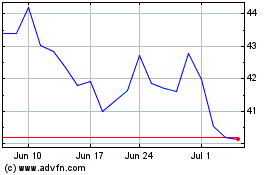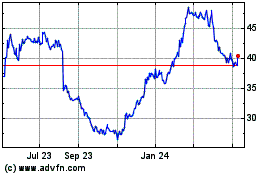Miles Cahn Turned Coach Into a Household Name
February 17 2017 - 10:29AM
Dow Jones News
By Suzanne Kapner
After World War II, Miles Cahn went to work for a small
manufacturer of men's wallets and other leather goods. He spent the
next 15 years wondering if he had made a mistake.
"We had only a few customers," Mr. Cahn wrote in "My Story," a
memoir that he self-published in 2008. "And it took our best
efforts to hold on to them." Mr. Cahn did more than hold on to a
few customers.
By 1961, he and his wife, Lillian, had bought the business and
renamed it the Coach Leatherware Co., unwittingly setting in motion
a revolution in American women's handbags.
Mr. Cahn died on Feb. 10 at his Manhattan apartment. He was
95.
Today, Coach Inc. is a global fashion and accessories brand,
with $4.5 billion in sales in its most recent financial year, which
ended July 2. But it was a different story in the year before Mr.
Cahn and his wife bought the company, at which time sales had just
edged past $1 million.
It was Mrs. Cahn, whom he married in 1947, who suggested getting
into women's handbags. "I laughed at the thought," Mr. Cahn told
the New Yorker in 2011. "In New York, there were a lot of handbag
companies, and at that time stores were all buying knockoffs of
bags made in Europe."
His wife not only prevailed, she came up with one of their most
popular designs, modeled after a paper shopping bag. Mrs. Cahn died
in 2013.
It was by accident, though, that Mr. Cahn hit on an innovation
that would distinguish Coach. One of his suppliers was trying to
get rid of a type of leather used to make baseball gloves and Mr.
Cahn agreed to buy some, recalled his daughter, Susi, in an
interview. The businessman was struck by the suppleness of the
leather, which helped give Coach bags their signature look. "These
soft, unconstructed bags soon developed a very loyal following,"
Mr. Cahn wrote last week in notes he prepared for his obituary.
Mr. Cahn was born April 18, 1921 to Russian Jewish immigrants.
He served in the Army's 78th Infantry Division during World War II,
and then returned to The City College of New York to finish his
degree in business administration. In 1946, he joined Gail Novelty
Co., a small New York factory that made men's billfolds. His
father, who had dabbled in residential real estate, was one of four
investors who had each put up $1,000 in 1941 to help start the
company. The younger Mr. Cahn was paid $50 a week.
Over the next four decades, Mr. Cahn, who favored bow ties,
turned Coach into a household name, often by breaking with
convention. He protested the Vietnam War by taking out an
advertisement in the New York Times addressed to President Richard
Nixon.
He paid employees above union wages, and began building a
network of retail stores long before competitors, which at that
time mainly relied on department stores, said Lew Frankfort, who
Mr. Cahn hired in 1979 and who served as Coach Chief Executive for
nearly two decades starting in 1995.
In 1985, the Cahns sold Coach for $30 million to Sara Lee Corp.,
which spun it off to shareholders in 2000. The Cahns left the
company at the time of the sale and bought a 600-acre goat farm in
Pine Plains, N.Y. With an initial herd of 200 goats that swelled to
1,500, the Coach Dairy Goat Farm helped popularize goat cheese in
the U.S. just as the farm-to-table movement took off. They sold the
farm in 2006, but Mr. Cahn secured a conservation easement to
protect the land in perpetuity.
He wrote about his passion in "The Perils and Pleasures of
Domesticating Goat Cheese," published in 2003. In his own eating
habits, Mr. Cahn displayed a curious mix of tastes. He started the
day with a pumpernickel bagel smeared with goat cheese, and ended
it with a glass of Armagnac and a Snickers candy bar, according to
his son David.
"Looking back at it, I can appreciate that life, for all its
randomness, has dealt me a good hand," Mr. Cahn wrote recently in
musings that he called "Reflections." "I will surrender it
reluctantly when my time is up and will sorely miss it when I am
gone."
Mr. Cahn is survived by his three children David, Julie and Susi
, who is married to the chef Mario Batali, and five
grandchildren.
Write to Suzanne Kapner at Suzanne.Kapner@wsj.com
(END) Dow Jones Newswires
February 17, 2017 10:14 ET (15:14 GMT)
Copyright (c) 2017 Dow Jones & Company, Inc.
Tapestry (NYSE:TPR)
Historical Stock Chart
From Aug 2024 to Sep 2024

Tapestry (NYSE:TPR)
Historical Stock Chart
From Sep 2023 to Sep 2024
